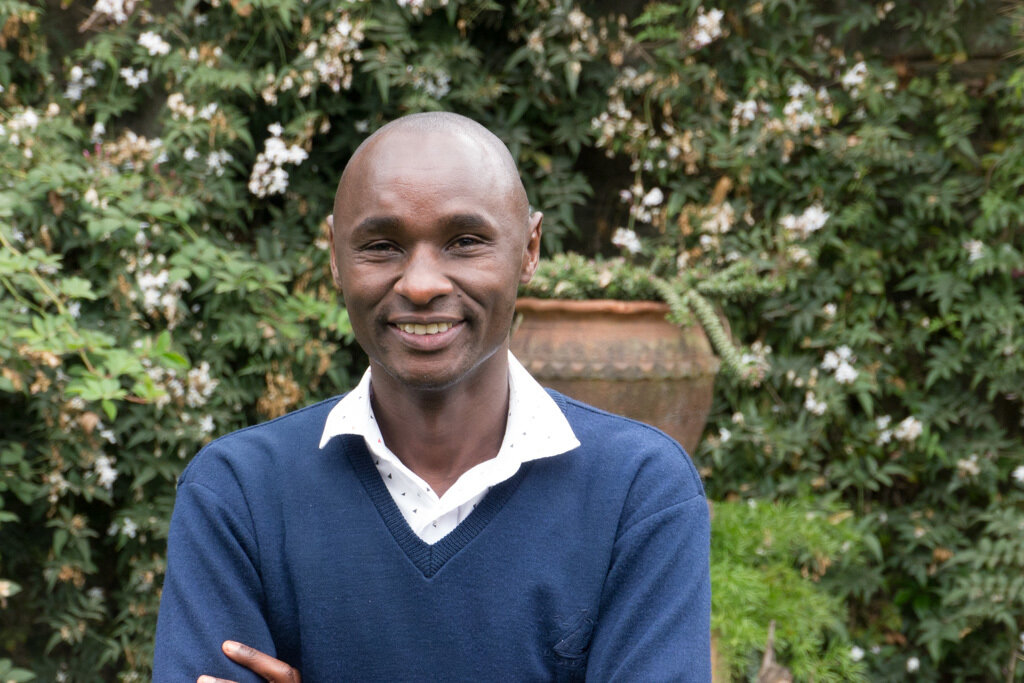What I Found in AIM
by Olivia Hurd
I’m not sure what I was expecting Wycliffe to look like when I met him. I’d heard about his story, and I guess I expected some sort of missionary war hero— kind of old, speaking in King James English. In reality, he was an ordinary man, well dressed, friendly, big smile. I instantly liked him. He was just a human with a story to tell.
Wycliffe started working for Africa Inland Mission’s (AIM) Eastern Region office in Nairobi, Kenya, in 2000, right after he graduated from Kenya College of Insurance studying CII and risk management. His first role with AIM was in Information Technology services. Then in 2001, because foreign missionaries regularly need to update their immigration status, he took on the role of helping them complete the paperwork. This is how Wycliffe knows, at least by name, all of the missionaries within Eastern Region. He married in 2004, and his AIM colleagues have walked alongside him as he’s grown in his marriage and into parenthood.
On a slightly overcast and cool morning, we met at the Eastern Region office and sat on the back porch of one of the missionary residences. The garden around us was welcoming, birds flitted around the flowers, and a small dog played in the grass. This peaceful place was where Wycliffe told me a gripping story of God’s work despite a traumatic experience.
The day before Eid (a Muslim holiday), his wife called him while he was on his way home from work, asking him to get meat for their guests. “It was approaching 7pm when I walked into a butchery,” he explained. “So I walked in and I realized there were many people on the floor, but I didn’t know what was happening because they were far out in the corner. There was a lady at the door, [who] ushered me in and said, ‘Go down, and don’t say anything!’
“So I got down like everyone else,” Wycliffe continued. “I could hear the traffic of people coming in, but it sounded like there was no movement of people going out, just coming in and coming in and more people were joining us onto the floor.”
Then the room went silent, causing Wycliffe and the others to wonder if the thieves had left. Many of them stood up together, but the thieves were, unfortunately, still there. Wycliffe was closest to the thieves, and before fleeing the scene, one of them looked Wycliffe in the eye and shot him in the stomach.
“There was no assistance at all,” Wycliffe remembered. “When people heard the gunshots, everyone fled, so there was no one to help.” He staggered to a pharmacy, blood seeping into his shoes, the people around him gaping at his wound. In the pharmacy, they couldn’t help him, so he went to another and was turned away again. Wycliffe then stopped a matatu (a taxi van) which took him to a police checkpoint. The police were reluctant to do anything, but they stopped a passing vehicle and directed the driver to take Wycliffe to a nearby hospital.
The driver’s wife asked Wycliffe for any phone numbers of people they could call. Wycliffe told her the one number he could remember, that of Tim Carol, a missionary who also worked at AIM. Tim told the lady to go to a different hospital, where Wycliffe had insurance and where his coworkers from AIM would be ready to receive him. Soon after, Wycliffe passed out and didn’t recall anything until the next day.
During surgery, the doctor discovered that the only injured organ was Wycliffe’s liver, a body part that can grow back after it has been damaged. “It’s amazing,” Wycliffe proclaimed. “That’s why I call it a huge miracle, a living miracle to be here, for the whole bullet to miss all the major organs and only get to the part that can [re]grow, and [that I can] just live like a normal person again… I’ve never needed any other dawa [Swahili for ‘medicine’] ever since, not even a pain killer, since the day that I walked out of the hospital.”
“AIM was there the whole time,” Wycliffe smiled. “I don’t even know of any other family that would have stuck with me and my family like AIM did. I found a new dimension on how you can live, because you can’t just live on money alone. I found a family that can pray for you, a family that you can share your needs with. I found that in AIM.”

